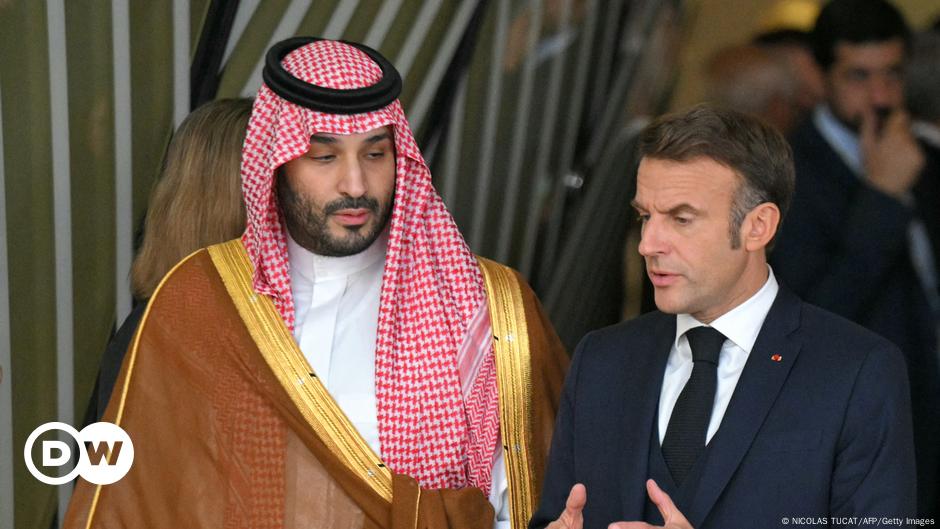Saudi Crown Prince Mohammed bin Salman was perhaps the highest profile representative meeting EU leaders in BrusselsImage: Johanna Geron/REUTERS
Instead, their focus was very much elsewhere, with both sides pressuring each other to come around to their way of thinking on the conflicts raging in their neighborhoods.
EU wanted harsher condemnation of Russia
EU and GCC sources both said the negotiations on the finalized joint statement in the weeks leading up to Wednesday’s summit were difficult. Top of Europe’s wishlist was strong wording condemning Moscow for its full-scale invasion of Ukraine.
One EU diplomat said initially, the GCC — the group of wealthy Gulf states that includes Saudi Arabia, Qatar, the United Arab Emirates, Bahrain, Kuwait and Oman — wanted no direct reference to Russia in the text.
Ultimately, leaders compromised by simply lifting the language from a 2022 United Nations General Assembly resolution in which they “deplore in the strongest terms the aggression by the Russian Federation against Ukraine.”
Cinzia Bianco, a visiting fellow at the European Council on Foreign Relations think tank, said EU states were keen to discuss Gulf states’ ties with Russia.
“While Qatar, Saudi Arabia, and the UAE have made significant mediation efforts between the warring parties — such as on the release of Ukrainian children detained in Russia and the exchange of prisoners of war — there is no common analysis between the Europeans and the Gulf states on the conflict’s genesis and resolution,” Bianco wrote in a paper published earlier this month.
The EU also wanted to tackle the thorny topic of how to avoid Russia evading western sanctions. Two earlier drafts of the statement seen by DW made explicit references to “preventing sanctions circumvention” but in a concession by Brussels, the final text made a vague reference to “strengthening dialogue on restrictive measures and their implementation.”
The Israel-Hamas war continues to rage in Gaza, with many EU & Gulf leaders making reference to the dire humanitarian situation in the stripImage: Ramadan Abed/REUTERS
Gulf pushed for tougher language on Middle East
With violence spiraling in several parts of the Middle East, Gulf states for their part pushed EU counterparts for tougher criticism of Israel. The joint declaration calls for ceasefires in both Gaza and Lebanon and condemns “the Israeli government’s decisions to further expand settlements and legalize settler outposts across the occupied West Bank.”
But one source from a GCC country told DW they were “disappointed” by the language on the Middle East when compared to what was agreed on Ukraine. Researcher Cinzia Bianco also warned Europeans “will need to do less lecturing and more listening, specifically on issues pertaining to the Middle East” when it comes to interactions with Gulf states.
Without directly criticizing the bloc, Qatari leader Sheikh Tamim Bin Hamad Al Thani warned against “any double standards” in his opening speech in Brussels, while the country’s foreign minister told press in Brussels that countries must not be “selective” about their principles.
How will Israel respond after Iran’s missile attack?
To view this video please enable JavaScript, and consider upgrading to a web browser that supports HTML5 video
Cautious words on Iran
Language on Iran, however, was more conciliatory.
In the joint statement, the EU and GCC “call on Iran to pursue regional de-escalation.”
They say they “regret” that Iran’s “unabated nuclear advances” have made a return to diplomatic deals designed to curtail Tehran’s activities “increasingly difficult.”
EU diplomats said Gulf states wanted to avoid strong critical language, despite Iran’s recent missile attacks on Israel and its backing for Houthi rebels who have been involved in direct conflict with the UAE and Saudi Arabia.
“On Iran, the situation is extremely dangerous and extremely sensitive. GCC countries are dealing with Iran through diplomacy and diplomacy is the only path forward,” a source from a GCC state told DW.
EU & Gulf leaders said they would work toward reviving talks on a long-stalled trade dealImage: Johanna Geron/REUTERS
More cooperation on trade, travel and energy
But geopolitics was not the only thing on leaders’ mind. The two sides said they would “aim” to “take forward” discussions on a bloc-to-bloc trade deal — an idea first pursued more than three decades ago but on ice since 2008. An EU diplomat said there were tensions within the GCC on whether to pursue trade with the EU as a Gulf group or to seek out bilateral deals.
The two sides also agreed to “work toward” simplifying access for people to travel between the two blocs. Some Gulf states have been pushing for waivers to ensure their citizens can more easily travel to the EU as tourists — a request which remains unanswered for now.
“We’ve fulfilled all the requirements for visa liberalization. We think this is more a question of political will,” a GCC source told DW on the sidelines of the talks.
The fallout of Russia’s war in Ukraine has also prompted the EU to seek new sources of energy as it raced to rid itself of dependence on Russian fuel. Gas and oil-rich Gulf states have become a key provider for the bloc, and the two sides said they were now committed to “intensifying” energy cooperation.
Source link : http://www.bing.com/news/apiclick.aspx?ref=FexRss&aid=&tid=67103dd1cc814cb4bd77a61d6edf896c&url=https%3A%2F%2Fwww.dw.com%2Fen%2Feu-gulf-states-seek-give-and-take-on-ukraine-middle-east%2Fa-70518325&c=10899392142731283633&mkt=de-de
Author :
Publish date : 2024-10-16 15:17:00
Copyright for syndicated content belongs to the linked Source.
